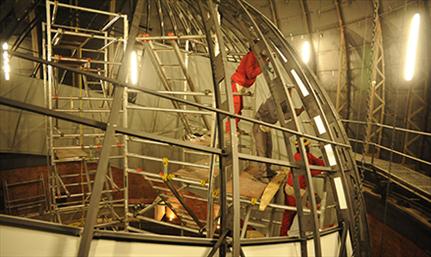Latest News Archive
Please select Category, Year, and then Month to display items
02 July 2019
|
Story Eloise Calitz
|
Photo Keagan Nkwaira
 Audience members listening attentively to the presentations at the Entrepreneurship Inter-varsity on the Bloemfontein Campus.
Audience members listening attentively to the presentations at the Entrepreneurship Inter-varsity on the Bloemfontein Campus.
The UFS continuously creates opportunities for students to develop and explore platforms where they can showcase their talents and share their innovative concepts. In the light of this, it is important for the institution to become a preferred academic knowledge partner that can conceptualise, develop, and successfully commercialise research activities, and through this foster an innovative and entrepreneurial culture that aligns to its Integrated Transformation Plan.
This is why opportunities such as the Entrepreneurship Intervarsity Competition are so important, since it encourages students to demonstrate their entrepreneurial talent, and through this connect with investors and industry leaders to start up a business.
The competition
Student entrepreneurs across the 26 public universities in South Africa were invited to submit their innovative ideas as part of a competition supported by Entrepreneurship Development in Higher Education (EDHE), in collaboration with the Allan Gray Orbis Foundation. The opportunities created through this initiative are twofold:
1. For student entrepreneurs to present their innovative ideas and businesses.
2. For universities to demonstrate their entrepreneurial talent and the ways in which they support and grow the next generation of business leaders.
The competition takes place in five stages. The process started with each student submitting their short videos and applications on the official competition site. Each institution also had the opportunity to select student entrepreneurs to take part in the competition. Fifteen students pitched their ideas during internal rounds at the UFS on 30 May 2019. Of these students, four were selected to represent the UFS at the regional rounds of the Entrepreneurship Intervarsity, where the finalists will be chosen.
The students were judged in four categories:
• Category 1: Innovative Ideas
• Category 2: Tech Businesses (existing businesses, formal or informal, undergrad or postgrad)
• Category 3: Social Impact Businesses (existing businesses, formal or informal, undergrad or postgrad)
• Category 4: General (existing businesses, formal or informal, undergrad or postgrad)
The following UFS entrants were selected to take part in the regional finals:
• Christopher Rothman for his liquid yeast culture that can be used in the fermentation of beer.
• Driaan-Lou Kemp for his patented water-saving device.
• Grace Mthembu for her electricity-saving system.
• Martin Clarke for his idea to use drone technology for the mining industry
Interior dome of Naval Hill planetarium reaches completion
2013-09-04
|
 |
Work on the inside of the dome
Photo: Reinier Brönn
01 September 2013 |
The interior perforated aluminium planetarium dome has been installed by an American expert from Astro-Tec, the American company that customised the dome for the planetarium on Naval Hill. The planetarium, the first digital planetarium in sub-Saharan Africa, is scheduled to open in November 2013. The UFS manages the project.
The dome arrived in parts by ship from the USA in June 2013. These parts consisted of a number of long curved ‘ribs’ and numerous perforated panels. The panels were attached in sections to the ribs to form a smooth concave shell, creating the surface for the projection system.
The next step will be the installation of the projection system itself.
The 86-year old Lamont-Hussey Observatory on Naval Hill, also known as the Sterrewag Theatre, is home to the planetarium. The planetarium is the first component of a proposed Centre for Earth and Space. This will be a multi-purpose facility to promote science communication and preservation, and the arts.
This project is a long-term partnership between three main organisations, each bringing essential components to the project: the Mangaung Metro Municipality (MMM) as the land-owner, the Free State Department of Economic Development, Tourism and Environmental Affairs (DETEA) and the UFS, which developed the concept for the planetarium project and will be responsible for its operation and further fundraising endeavours.
The National Department of Science and Technology also joined this venture subsequent to providing substantial funding to the UFS in order to purchase the projection system for the planetarium.